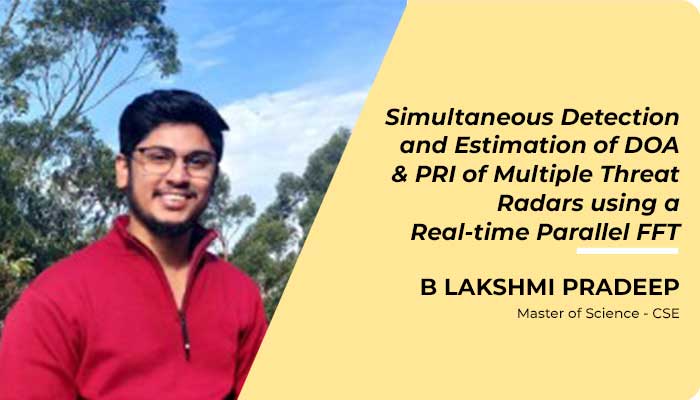Bheema Lakshmi Pradeep, supervised by Dr. Azeemuddin Syed received his Master of Science in Computer Science and Engineering (CSE). Here’s a summary of his research work on Simultaneous Detection and Estimation of DOA & PRI of Multiple Threat Radars using a Real-time Parallel FFT:
The ability to accurately identify the direction-of-arrival (DOA) and other signal parameters of an incoming radio signal is crucial in many applications, such as military and commercial communication systems. To meet this need, this paper proposes a system for direction finding and pulse parameter estimation that has been designed and implemented using a novel real-time multi-channel parallel Fast Fourier Transform (FFT) on a Field Programmable Gate Array (FPGA). The proposed system employs a unique approach that allows for the implementation of the FFT operation 5.5 times faster than the traditional IP-core-based implementation, with fewer arithmetic operations and a throughput of 1.35 Giga samples per second (Gsps). The parallel processing capabilities of the FPGA are utilised to enable the system to process multiple signals simultaneously in real-time. To achieve high precision in DOA estimation, the system employs the sum-difference monopulse technique. This technique utilises the difference in the amplitudes of two signals received by two antennas. By comparing the amplitude difference with the sum of the signals, the angle of arrival of the incoming radio signal can be estimated with high precision, up to 1 degree. The proposed system’s hardware implementation has been thoroughly studied and verified experimentally through the development of a real-time prototype of the DOA estimation system. The prototype is capable of processing multiple signals in real-time and accurately estimating the direction-of-arrival of the incoming radio signal. Overall, the proposed system provides an efficient and reliable solution for direction finding and pulse parameter estimation in various commercial and military applications. The use of a novel real-time multi-channel parallel FFT on an FPGA enables fast and accurate signal processing, while the sum-difference monopulse technique ensures high precision in DOA estimation. This makes the system suitable for use in various fields, including communication systems, radar systems, and electronic warfare systems.
October 2023

